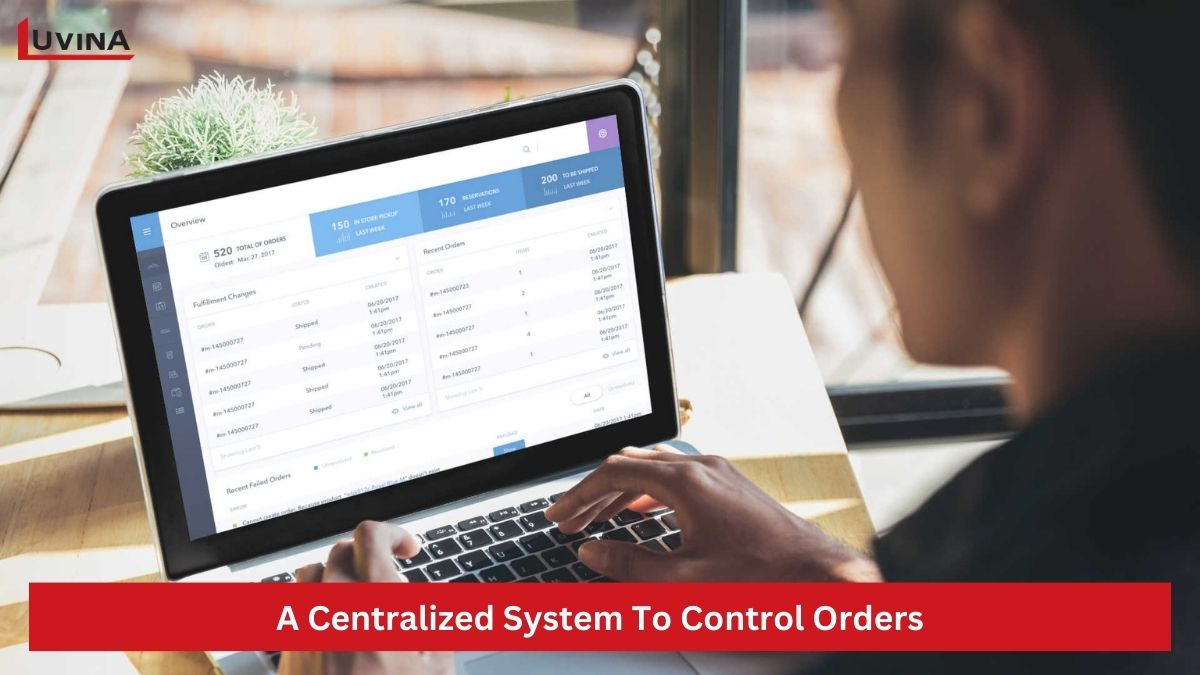With the ability to reduce manual errors and improve order accuracy, a custom order management system helps companies in retail and e-commerce handle larger order volumes, leading to better growth. If you’re exploring building such a system for your business, this article shares essential insights on its features, potential challenges, and estimated costs. Keep reading to find out more.
What Is an Order Management System?
Custom order management refers to the overall process of tracking, managing, and fulfilling orders from the moment customers place them until delivery to the correct address. A custom order management system is a tool used by businesses to oversee this entire process. In retail and e-commerce, these systems automate the tracking of goods, control delivery, and ensure customers receive their orders accurately, on time, and in good condition.

Modern client order management systems go beyond simple order fulfillment. They can control the entire client order management process, prevent issues like late deliveries and returns, and optimize profits by reducing return costs. Based on critical data synthesized by these systems, businesses can easily monitor ongoing operations and identify areas for improvement.
Key Features of Order Management Systems
The features of each Client Order Management System software can vary based on the needs of different industries. Generally, these systems include several basic features:
- Order creation and processing: This is a key feature of a custom order management system. It handles tasks like collecting orders from various channels and manually creating orders when necessary.
- Order fulfillment: Orders are automatically approved for shipment if the system finds the items in stock and fully paid. This feature also optimizes routing of orders to the most suitable warehouse and allows customers to modify or cancel orders through multiple channels.
- Return order management: This feature ensures transparent handling of returns. The return order management system automatically retrieves related order details to create return requests and calculate refund amounts.

- Shipping management: This feature optimizes the shipping process by controlling the transportation of orders efficiently. It supports various shipping methods and organizes orders for convenient transportation. For example, the custom order management system can consolidate multiple orders into one shipment when they are going to the same address, or split orders into multiple packages if the weight or size is too large.
- Reporting and analysis: This feature provides detailed reporting and analysis capabilities for informed decision-making. The order management system’s analysis and reports display current orders, orders awaiting processing, customer requests, and relevant KPIs.
Custom Order Management vs. Ready-Made Software
To optimize order management processes for your business, you can choose between a custom order management system designed specifically for your business needs or ready-made solutions designed for easy, widespread use across various businesses. Each option has its own pros and cons, which can impact business operations differently in retail and e-commerce.
So, what are the differences between custom order management software and off-the-shelf systems? Which one should you use? Let’s explore each type and compare them in detail.
1. Ready-made solutions
Off-the-shelf order management systems are developed for various users. The functions of these systems are pre-defined and cannot be customized to meet the specific business needs of each enterprise. To use these order management systems, you need to purchase a license. Currently, many businesses on the market are using these ready-made solutions because they are efficient and highly adaptable. Some widely used off-the-shelf order management solutions on the market include SAP, Oracle, NetSuite, and Zoho.
2. Custom order management software
In contrast to off-the-shelf solutions, custom order management systems are designed and tailored flexibly to meet the specific business process needs of each company. To build such a system, developers need to consider the company’s scale, the essential functionalities required for its business operations, and specific industry considerations. Compared to ready-made order solutions, custom order management systems offer several advantages, such as higher flexibility, better seamless integration capabilities, improved compliance with regulations and standards, and potential long-term cost savings.
Let’s compare these 2 types of client order management systems in detail:
| Ready-made softwares | Custom order management softwares | |
| Cost | Lower initial investment costs but could incur higher costs in the long run. | Higher initial investment costs but lead to long-term cost savings and better ROI. |
| Time to develop | Require less time for deployment. | Take longer to deploy due to the need for building and customizing solutions according to business needs. |
| Customization | Limited. | Allow for flexible customization to meet business requirements, enabling the addition or removal of features as needed. |
| Integration capability | Integrate seamlessly with various other software. | Limited integration capability with other software. |
| Scalability and future-proofing | Adjusted to fit current business scale, making scability challenging. | Designed for easy scalability based on business growth levels. |
| User-friendliness | Designed for widespread use, so it may not be highly user-friendly for specific businesses. | Features are designed for quick familiarity and ease of use by the business’s employees. |
| Upgrades, maintenance, and support | Upgrades can be rolled out promptly at any time. | Upgrades are executed only when needed by the business and when the development team can conveniently handle and test them. |
| Security level | Depend on the security capabilities of the solution provider. | Can integrate advanced security aspects to minimize related risks. |
| Compliance | Adhere to global data security standards | Fully comply with necessary standards, including industry-specific and global regulations |
| Ease of adaptation | Difficult to adopt and require time to adapt due to complex UX/UI. | Quick to adapt and user-friendly due to intuitive UX/UI design. |
Challenges of Building a Custom Order Management System
Building a custom order management system can present several common challenges:
1. Technical requirements
The client order management system serves as the core of a business, overseeing order coordination and managing complex customer interactions. Each business operates in different sectors with unique operational needs. Therefore, when developing a custom order management system for any business, it’s essential to dedicate time to identifying and prioritizing technological and technical requirements. These requirements serve as a blueprint for constructing an effective order management system.
2. Regulatory Compliance
Compliance with regulations should be a top priority during the development of client order management software. Adhering to all local and possibly global regulations helps minimize legal risks and ensures smooth system operations across various sectors.

3. Lack of expertise
Unless you’re running a tech company, you may face challenges due to a lack of IT expertise needed to develop an efficient order management system. This often leaves businesses with two choices: either tasking existing staff to build a basic system or hiring an external team of IT experts.
4. Difficulties in adaptation and scalability
As your business evolves and changes in scale, the order management system must have the capability to adapt and scale accordingly to fit the changes in business operations. Relying too much on a rigid system without scalability capabilities can lead your company to be stuck in an inefficient workflow.
Cost to Build Custom Order Management Software
According to surveys, developing a custom order management system can cost businesses anywhere from $80,000 to over $200,000. The development cost of the software can be influenced by several factors, such as the number and complexity of features, the technology platform, the development timeline, company scale, and the hourly rates of developers.
For instance, to develop a simple order management software system, you would need a team consisting of business analysts, UX/UI designers, developers, QA engineers, and possibly DevOps engineers. The composition of the team may vary depending on the product requirements and system complexity. If you work with technical experts in regions with lower hourly wage rates, the software development costs will be lower. Conversely, choosing to work with experts in regions with higher hourly wage rates (such as in the US or Europe) will result in higher software development costs.
How can Luvina help?
Luvina is a software development company with over 20 years of experience in the IT industry. Since our establishment, we have been committed to providing top-notch services to the retail sector and e-commerce businesses. Over the years, we have assisted numerous businesses of varying scales in automating processes and achieving competitive advantages through custom software solutions.

Order management is a critical function for e-commerce and retail businesses. An efficient order management system enhances accuracy and customer satisfaction. With our extensive experience and structured training processes, Luvina – a retail software development company has successfully executed many client order management system projects tailored for both B2B and B2C enterprises.
Partner with Luvina to experience the highest quality services accredited with ISO 9001 and CMMI Level 3 certifications. We guarantee data security with modern infrastructure that complies with international standards and offer 24/7 support in both English and Japanese, regardless of time zones. If you are planning to enhance your retail operations and streamline order management effectively, Luvina is ready to collaborate with you to build a custom order management system tailored to your business needs. Contact us today and share your idea with us.
Related Posts









Read More From Us?
Sign up for our newsletter
Read More From Us?
Sign up for our newsletter